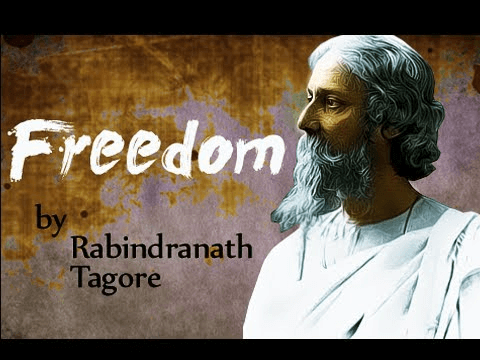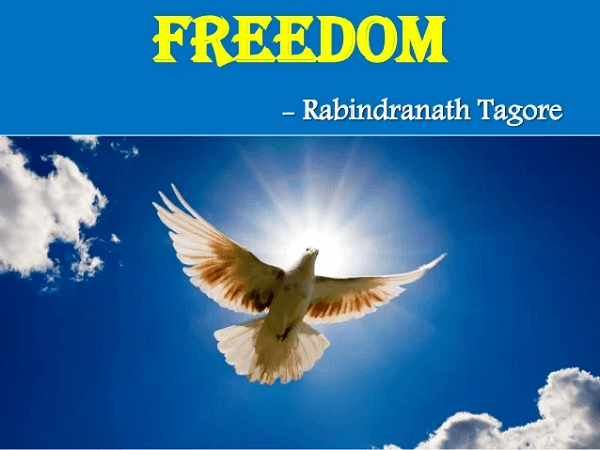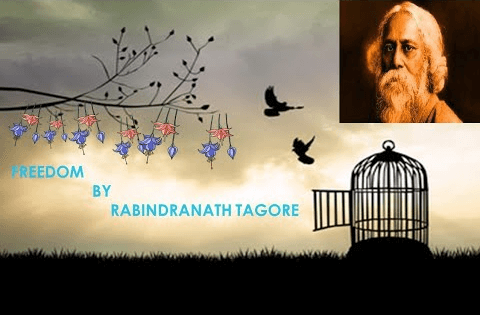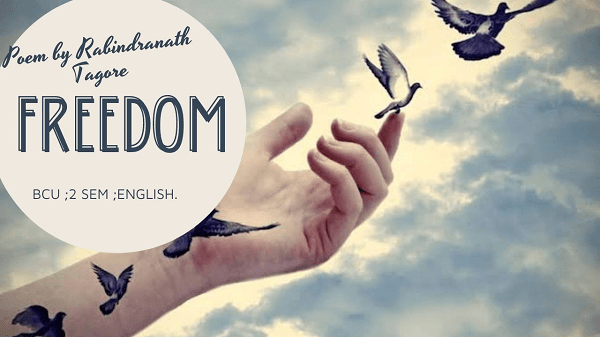Freedom Poem SummaryRabindranath Tagore was well-known in Bengal, India, throughout the nineteenth century. In addition to his numerous literary endeavors, he was concerned with the welfare of the ordinary man and fought for social reform. To put his Upanishadic educational principles to the test, he established an experimental school in Shantiniketan. He also got involved with the Indian Nationalist Movement. 
He developed into a significant living institution in India, notably in Bengal, and the voice of India's spiritual history to the rest of the world. Through his non-sentimental and imaginative perspective, in the poem "Freedom," the author asserts that for freedom to be felt in couples, it must first start in each heart. The Poem "Freedom" is Summarized as Follows:Tagore, The Bard of Bengal, wrote a poem dedicated to freedom. He rose to fame in 1913 thanks to the outstanding novel "Gitanjali," which helped him become the first male non-European to win the prestigious Nobel Prize in Literature. His aspirations and vision for his native India are expressed in the poem "Freedom" by the author. He was a vocal advocate for India's independence from Britain and the abolition of the British Raj, which is the topic of the poem "Freedom." India's independence from terror is his top hope for it. He thinks that the reason she is enslaved is because of the fear of her compatriots. He refers to India as the "motherland" in the initial two lines of the poem and expresses his desire for it to be courageous. Alliteration, or the recurrence of the "f" sound in words "freedom," "from," "fear," and "freedom" in the opening line, is a literary device he uses to stress the urgency of his appeal to Indian independence. The word "freedom" appears multiple times in the poem to convey the poet's strong desire for his nation to remain independent. 
The second hope he has for his country is that she be freed from the burden of absurd, irrational, and conventional ideas and traditions that keep her from looking to the future. In the third line, he emphasizes his desire for India to be rid of the "burden of the ages," a reference to the English yoke of dominance over that country, further developing the metaphor of India as an elderly mother. The aging woman who stands in for India bows her head, arches her back, and closes her eyes as if colonialism crushed her. Due to the repeated "b" sound, alliteration is also used in these lines. India cannot see the future or envision a better future for herself because of the blinding of her eyes, as described by Tagore. As India drifts off to sleep, she is bound by what Tagore calls the "shackles of slumber," or time spent not thinking about it. On the other hand, India is strongly committed to its colonial past and today, as evidenced by the phrase "in night's stillness," which she uses to describe her position. The country does not look around in its dark moment (represented by darkness) and envision a better future as an independent country because it "distrusts the star that speaks of truth's adventurous paths," which indicates that it does not believe in the adventurous paths of truth. He wants his motherland, India, to dare to travel down the adventurous path, not to place too much faith in an uncertain future, and avoid handing control of her advance to people who are heartless and narrow-minded. This is his motherland's third wish for him. His last wish for her motherland is to be liberated from the humiliation of living as a slave to foreign invaders. When Tagore calls for "liberation from the anarchy of destiny," he implies that he doesn't want his nation to accept the fate assigned to it obediently. This fate, or destiny, was contrasted by Tagore to a sailboat being steered by a cold hand and having to obey winds blowing in all directions. This is a simile that compares his nation to a sailboat that is being steered by someone who is careless and is sailing inclement weather. He tells her to stop acting like the show's director is controlling and premeditating her every move, like a puppet. He wants her motherland to be free to live as she sees fit, making the choices that will determine her future. Tagore then calls for freedom from India, claiming that he lives in a "puppet's world," where India is ruled by other nations and forces, similarly to how a puppet is used by its puppeteer. The actions are controlled by "brainless wires," suggesting that England rules India without planning ahead and by abiding by "mindless habits" or traditions that are followed without good cause. Figures, who are Indians, wait obediently merely to obey the master of the show, which is to say their English masters, in this lengthy metaphor comparing India to a puppet show. As a result, the Indians lead "a mimicry of life," which is to say, a fake existence under the control of others. Themes:Freedom, enslavement, ignorance, creativity, blind obedience, and pain are some of the issues that Tagore examines in this poem. The poet yearns for a nation where everyone can live unrestricted freedom and advance their spiritual and emotional development. Speaking of the harshness of the colonizers, he discusses the terror. The subject of slavery is brought up in the lines that follow. He portrays a figure bowed down in submission to the weight of persecution and shame. The truth and hope are also invisible to her. 
In addition, Tagore demonstrates the ignorance of his fellow citizens. Rather than taking the right route, they are happy to remain in the dark. The poet emphasizes blind obedience and lack of inventiveness by portraying the nation as a "puppet's world". Full independence on a mental, spiritual, and political level is the main concept of this essay, to name only a few things. Analysis:He emphasizes the urgency of his plea for Indian independence by using the 'f' sound in terms like "freedom," "from," and "fear" in an alliterative manner. The poet frequently refers to his genuine longing for emancipation from the oppression of colonial powers as "freedom". He portrays his motherland as old, with her back broken and her eyes blinded. Because colonial powers keep her in submission, India is still looking for a promising future. India is unable to move because of her restrictions. She must free herself from oppression, says Tagore. India must emerge from its protracted inaction and look to the future. She should always follow the truth, and she will soon achieve triumph. Such an unfortunate fate must not be accepted; instead, one must flee the "blind uncertain winds". Here, India is compared to a sailing ship that floats due to the white people's careless orders and keeps making the same mistakes. By comparing India to an imperial puppet, the movements of which are predetermined by the master, a master and slave image is presented. India must work to end the humiliation of being a puppet under the control of a stupid master. 
Given that White institutions care the least about the welfare of Indians, India should have the guts to abolish them. The chains that bind us to ignorance and darkness will become even more tense if we don't overcome this dread. Being ruled by foreigners in one's own country means living an unreal life. Tagore uses the right analogies to give the reader a sense of patriotism. Background History:Writing "Freedom" in the colonial era, when his nation was subject to British rule, was Rabindranath Tagore's way of protesting the oppression he felt. By drafting this essay, Tagore aimed to teach his fellow citizens the true meaning of freedom. The late nineteenth century saw the composition of this poem. He backed the Indian nationalists and was adamantly against British imperialism. His nationalist views are reflected in this poem. He was a 20-year-old male at the time. He then grew weary of India's brand of nationalism and devoted himself to internationalism. Conclusion:This poem describes how the genuine meaning of freedom which wasn't present then came to be attained. The persona wants to achieve true freedom in all senses of the world instead of pursuing fictitious pretenses of freedom.
Next TopicMacbeth Summary
|
 For Videos Join Our Youtube Channel: Join Now
For Videos Join Our Youtube Channel: Join Now
Feedback
- Send your Feedback to [email protected]
Help Others, Please Share









